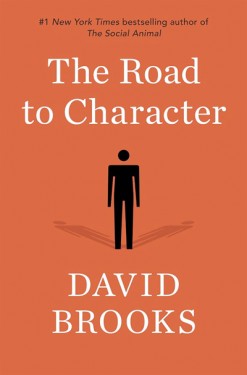I don’t recall when I began regularly reading David Brooks’ columns in The New York Times. Was it two or three years ago? Whenever it was that I became an enthusiastic fan, I continue to marvel at his interests and his insights. He frequently writes about values and the transcendent and the dangers of living in a strongly secular society.
When I discuss with friends ideas that Brooks presents regularly in his columns, at least during the last two or three years, they wonder if he is undergoing some kind of intellectual conversion. Whatever is going on in his life, I greatly admire both the quality and clarity of his writing and the topics he chooses to discuss. Every Friday evening I watch the PBS NewsHour to view Brooks and Mark Shields, another favorite of mine, discuss what is going on in the political world. Every Friday they bring their wisdom to what is going on politically in our country.
Because I admire Brooks so much, I decided to read his latest book: “The Road to Character” (New York: Random House, $28, pp. 300). When I began the book, my expectations were high, and I was not disappointed.
“The Road to Character” is an excellent book. Very early in the book there is a paragraph that summarizes what Brooks wishes to explore and analyze. Pointing out that there are two opposing sides to our nature, which he calls Adam I and Adam II, and indicating that what is important to each side is radically different and can lead to two very different lives, Brooks writes the following:
“While Adam I wants to conquer the world, Adam II wants to obey a calling to serve the world. While Adam I is creative and savors his own accomplishments, Adam II sometimes renounces worldly success and status for the sake of some sacred purpose. While Adam I asks how things work, Adam II asks why things exist, and what ultimately we are here for. While Adam I wants to venture forth, Adam II wants to return to his roots and savor the warmth of a family meal. While Adam I’s motto is ‘Success,’ Adam II experiences life as moral drama. His motto is ‘Charity, love, and redemption.’ (p. xii)
Part of the Larger Story
Brooks’ book consists of an Introduction and 10 chapters. In his first chapter, he discusses what he calls an older moral ecology. He is referring to the belief that emphasized our own brokenness and failings, but also stressed that we could improve by facing our faults and correcting them. By facing our sins and failings, we were being invited into a great moral drama. Each of our stories could play a role in the larger story of the human race. There was a general belief that we could develop virtue, make ourselves better and so contribute to the betterment of the world. We really could make a difference!
Brooks announces that throughout the book he will try to show what character building looks like in real life. He stresses what I guess should be obvious, namely that the best teacher is good example, and we have a precious opportunity to improve morally when we meet people whom we admire and love. Their lives challenge us to be better. It is true that there is no such thing as a self-made man and that may be profoundly true concerning the building of moral character.
After reading Brooks’ emphasis on the importance of good example, I thought about my own life. Though this seems strange to me, I wonder if I have ever tried to make a list of people who have had a profound impact on my life. My mother, father and sister come to mind immediately, but after those three, the list seems almost infinite. So many people have been gifts in my life and have challenged me to be better.
Character Builders
I think of religious sisters who taught me in grammar school, priests who served in my parish, Jesuit priests and scholastics and lay men who taught and coached me in high school. The intelligent professors I had in the seminary and in graduate school come to mind. All were unselfish enough to dedicate their lives to teaching. I have been extraordinarily blessed in my life with wonderful friends.
Brooks’ book has really jarred my memory. I have to stop writing because there is a word limit to this weekly column. I encourage readers to allow their memory to go over their past relationships and cherish the blessings and gifts that people have been in their lives. If we do that, we may experience a profound gratitude. That’s what I am feeling as I am writing this.
—-
Father Robert Lauder is a philosophy professor at St. John’s University, Jamaica, and author of “Pope Francis’ Spirituality and Our Story” (Resurrection Press).

